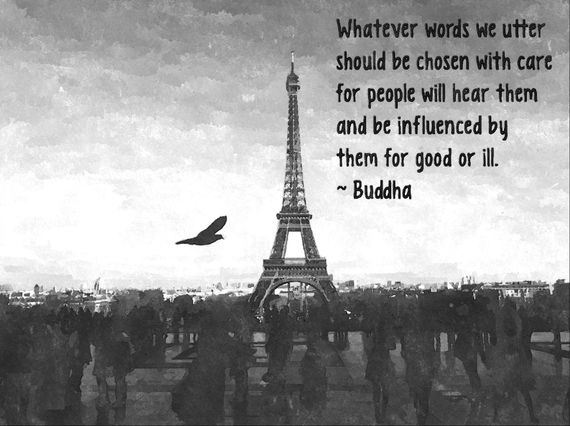Rhetoric is an interesting thing. On one hand, it is just a collection of words. On the other hand, it is an expression of values and intentions. I do not know Donald Trump personally. I can only use what he says publicly to guess at his values and intentions. And, I am increasingly stunned by his choice of words. The irony here is that there are at least are four methods of communication that Donald Trump and ISIS have in common. I am, in no way, suggesting that Donald Trump is a terrorist or an enemy of the state. I am suggesting that the words he chooses, and the sentiment they create, pose a challenge and an opportunity for a civil, pluralistic society.
1. Using fear
It is no secret that the aim of ISIS is to destabilize modern western society by terrifying people. Violent attacks are not their only weapon. ISIS uses videos, websites, and threatening newsletters filled with constant predictions of our downfall unless we change our ways.
Trump also focuses on the idea that America is doomed unless we change our ways; i.e. follow his direction. He uses the downfall of the American dream, the certain repeat of 9/11, the exportation of jobs, and the infiltration of our country with "others" as a rallying cry. According to Trump, we need to be ever vigilant against the invasion and influence of "rapists", "drug dealers", "bimbos" and "losers." People who disagree with him are "terrible", "disgusting", "slobs", and "stupid." And the only way to be safe? "Build a wall", "keep 'em out", and "bomb the hell out of them."
2. Creating a "them"
In order for ISIS to recruit members, it is important that non-Muslim westerners are portrayed as "them" -- masses of disposable enemies. There is no room in terrorism for thinking about people as individuals with complex views and beliefs. Gray area and nuance are poor recruiting tools.
China, Mexicans, Muslims, people who disagree with him, people who ask questions he doesn't like -- the list of "them" keeps growing for Donald Trump. "They" are the problem. "They" are the people that need to "shut up", "get out", "be kept out", and, if necessary,"wiped out." In one moment he says "Black guys counting my money! I hate it. The only kind of people I want counting my money are short guys that wear yarmulkes every day." And then he says "I have a great relationship with the blacks. I've always had a great relationship with the blacks." "I just have great respect for them and you know they like me." Even when he reports how loving and loved he is, Donald Trump uses the words "them" and "they." He has effectively clumped individuals who may or may not share common culture or beliefs into the group titled "them." This is the foundation of marginalizing and scapegoating.
Radicalizing with propaganda
ISIS uses Islam to justify their heinous activities. ISIS propaganda points to the western conspiracy against Muslims as the reason for jihad. Radical statements are made with no evidence other than the vehemence of the speaker. There is no indication of any openness to dialog or any room for compromise in the rhetoric or actions of ISIS.
Donald Trump claims Christian faith and keeps a pastor by his side at rallies, but there is no basis in Christianity to support the things he is calling for. And there is no evidence for many of the things he says. Trump simply sticks by his assertions and insists that there must be a cover up, that people are lying, or that people are idiots. He relies heavily on conspiratorial language such as "something is going on", "people are talking about it" , "somebody knows what's happening", and "we need to get to the bottom of this." While thousands of reputable scientists produce mountains of data pointing to global climate change, Trump says that "the concept of global warming was created by and for the Chinese in order to make U.S. manufacturing non-competitive." And remember the birther movement?
Advocating violence against the innocent
ISIS insists that infidels simply deserve to die. It does not matter if the people who are killed have any active role in the military or government. ISIS seeks to create terror precisely by targeting civilians in non-combat areas.
When someone cheered "black lives matter" at a rally, Donald Trump said that the disrupter "deserved to be roughed up." He has said that in order to deal with terrorists, we should "take out their families." This is where I would really like us to pause for a moment... Someone who wants to be president of the United States is advocating killing women and children -- and he is being cheered on in the name of American pride and values.
So what?
My goal here is not to vilify Donald Trump. I don't think it helps to draw more lines between people. I don't have to look very hard to find plenty of things that I believe, and sometimes say out loud, that are not helpful at all. My goal in writing this is to bring attention to the importance of the language we use. I propose that using the rhetoric of our enemies will not create the society we seek. Unless, of course, the society we seek is one that is dominated by fear, blame, segregation and violence.
I also propose that all of this presents an opportunity. If we want a society that operates out of awareness, compassion, and purposeful action, then this needs to come through in the language we use to frame our circumstances and our options. In referring to blocking Muslims from entering the country, Donald Trump has said "We have no choice. We have no choice. We have no choice." This is another rhetorical tool that hides the truth. Of course we have a choice. And the choices that we make defines who we are -- as individuals and as a nation.

